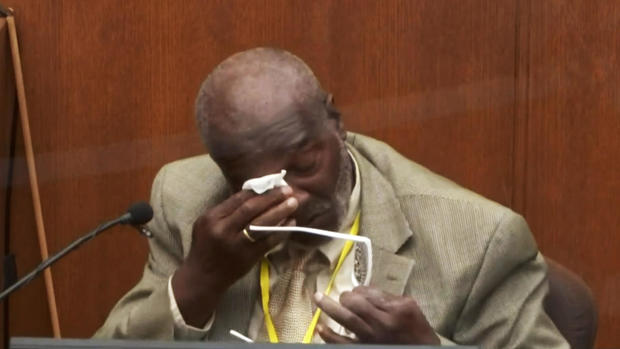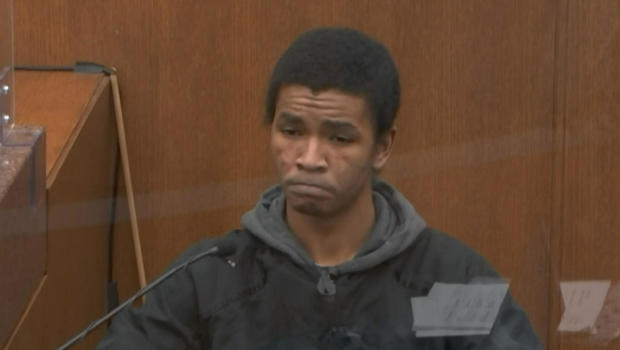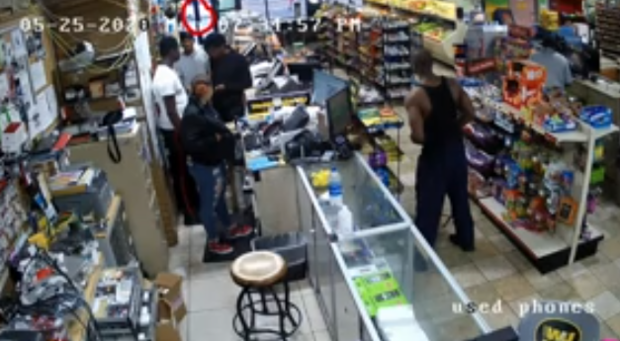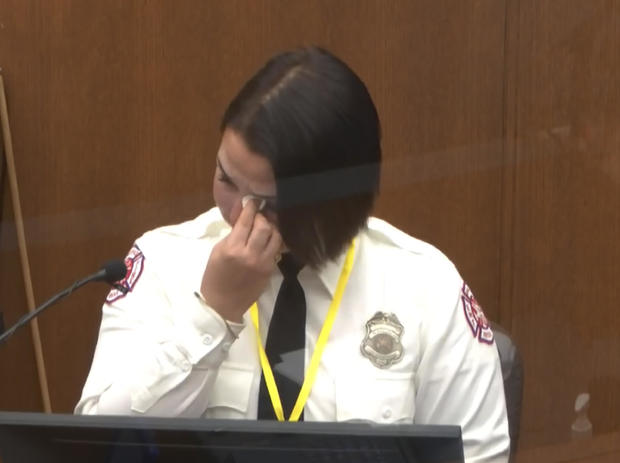Derek Chauvin Trial 3/31/21: Witness sobs watching video of George Floyd struggling with officers in squad car
get the free appFollow the latest trial updates here. Earlier coverage is below.
In a third day of sometimes tense and emotional testimony, prosecutors continued to lay out their case Wednesday against Derek Chauvin, the fired Minneapolis officer charged in the death of George Floyd.
Chauvin, who was seen in a disturbing video kneeling on the neck of the unarmed Black man, is charged with second-degree murder, third-degree murder and second-degree manslaughter. He has pleaded not guilty.
Court adjourned for the day after jurors watched body camera videos of the fatal encounter. Earlier Wednesday, a bystander witness broke down in tears on the stand as prosecutors played police body camera video showing officers attempting to force Floyd inside a squad car. Charles McMillian, who was on the sidewalk during the struggle, sobbed and said he felt "helpless." McMillian testified he yelled to Floyd that he "can't win" to encourage him to comply with officers.
Earlier Wednesday, Christopher Martin, a Cup Foods clerk who interacted with Floyd before his fatal arrest, began his testimony. Martin described taking a counterfeit $20 bill from Floyd despite knowing it was a fake, as prosecutors played surveillance video from inside the store which hasn't previously been seen. Martin said he took the bill because he recognized Floyd's friend as the same person who tried to pass him another counterfeit bill earlier in the day. He believed the bill Floyd passed him may have been the same one, and that Floyd may not have known it was a fake.
Martin described twice approaching the car where Floyd was sitting with two friends to ask him to come back inside, but Floyd did not.
Later, Martin described watching Floyd's fatal arrest and feeling "disbelief and guilt."
"If I would have just not taken the bill, this could have been avoided," Martin testified.
Earlier, Minneapolis firefighter and emergency medical technician Genevieve Hansen, who was heard on video repeatedly asking the officers to take Floyd's pulse, returned to the stand briefly Wednesday morning to conclude her testimony. On Tuesday, Hansen testified she was "desperate" to help the man, but she said officers wouldn't allow her to provide medical assistance, leaving her feeling frustrated, helpless and "totally distressed."
"There's a man being killed, and had I had access to a call similar to that, I would have been able to provide medical attention to the best of my ability, and this human was denied that right," said Hansen.
Floyd's killing last May drew outrage and a worldwide reckoning on police reform and racial justice. Three other officers involved in the fatal arrest are charged with aiding and abetting, and will be tried jointly in August.
Court adjourns for the day after bodycam testimony
Judge Peter Cahill has dismissed the jury until Thursday morning. Defense attorney Eric Nelson briefly questioned Minneapolis Police Lt. James Jeffrey Rugel about the capabilities of police surveillance video and body cameras before court adjourned for the day.
Disturbing police bodycam video played in court
Prosecutors are playing police body camera video showing Floyd's fatal encounter with officers. The videos came during the testimony of Lt. James Jeffrey Rugel, who manages technology systems for the Minneapolis Police Department.
Rugel first testified briefly about the department's body camera policies and procedures.
Bystander testifies he felt "it was over" for Floyd
Charles McMillian has concluded his testimony, appearing more composed after a brief break. McMillian said that as watched Chauvin press his knee into Floyd's neck, he heard Floyd begging that he couldn't breathe and yelling "Mama" and "You're killing me."
McMillian yelled to Floyd to get up and get in the police car. He told prosecutor Erin Eldridge he was "trying to help him."
When asked how Floyd appeared to him, McMillian said he was "in and out" with foam coming out of his mouth.
"I knew then in my mind, in my instinct, it was over for Mr. Floyd," McMillian said. "He was dead."
McMillian said he recognized Chauvin as an officer who patrolled the area. He said about five days earlier he had seen Chauvin in the neighborhood and told him, "At the end of the day, you go home to your family safe, and you let the next person go home to their family safe."
Prosecutors played video showing McMillian approaching Chauvin after the incident, reminding him of the earlier comment and saying he didn't respect what he did. Chauvin can be heard saying, "That's your perspective."
McMillian told the prosecutor he wanted to let Chauvin know, "What I watched was wrong."
Defense attorney Eric Nelson did not cross-examine McMillian.
Witness breaks down in tears watching police video
Charles McMillian, who witnessed Floyd's fatal arrest, broke down in tears on the stand just after he watched police body camera video of officers trying to force Floyd inside a squad car. McMillian was on the sidewalk as Floyd struggled with officers.
After watching the video, McMillian hung his head and sobbed. He removed his glasses and used tissues to wipe tears from his eyes. When asked to describe how he was feeling, McMillian said "helpless" and that his mother had died in June. Judge Peter Cahill called a break.
Earlier, McMillian told prosecutor Erin Eldridge he was the person telling Floyd he "can't win." McMillian said he was trying to encourage Floyd to comply with officers to make the situation easier for him.
"I've had interactions with officers myself, and I understand once you get in the cuffs, you can't win, you're done," he said.
Clerk: Floyd may not have known bill was fake
Cup Foods clerk Christopher Martin concluded his testimony after a cross-examination by defense attorney Eric Nelson, who asked whether he would agree Floyd and his friend refused to come back inside the store. Martin agreed. When asked whether he immediately recognized the bill Floyd used as a fake, Martin said he did.
But he said he took the bill and didn't immediately flag it to his manager because he believed Floyd may not have known the bill was counterfeit. Martin said he recognized Floyd's friend as the same person who had tried to pass him another counterfeit bill earlier in the day, which he had refused to take. Martin said he suspected the bill Floyd tried to pass him may have been the same one.
"The other person kind of seemed like he was trying to scheme, like he knew it was a fake bill," Martin said. "...I thought that George didn't really know it was a fake bill, so I thought I was doing him a favor."
In a statement released to CBS station WCCO, a representative for Cup Foods said it's not store protocol to send employees outside. The manager sent Martin outside to speak with George Floyd on May 25 "because we had a good enough relationship with [Floyd] and we felt like he didn't know it was counterfeit."
Martin told Nelson he believed Floyd was under the influence of something because he was delayed in his responses and was having difficulty forming some words.
On re-direct questioning by prosecutor Matthew Frank, Martin said Floyd's demeanor inside the store had been approachable, friendly and talkative, "but he did seem high."
Next to take the stand was Christopher Belfry, a 45-year-old south Minneapolis resident who parked just behind the car Floyd was inside. Belfry described seeing two officers approach the car, and one of them open the driver's side door and point his gun. Belfry started recording on his cellphone, a video Frank played in court.
Court then recessed for a lunch break.
Cup Foods clerk describes "disbelief and guilt"
Prosecutor Matthew Frank played surveillance video from outside Cup Foods that showed clerk Christopher Martin and a co-worker approaching the car where Floyd was sitting with two friends. Martin said he told Floyd's friend the bill Floyd used was a fake and his manager wanted Floyd to come back inside the store, but Floyd didn't return to the store.
Martin said he went back inside the store and told his manager, offering to pay for the counterfeit bill, but his manager told him to return to the car. Martin and two other co-workers again approached the car and asked Floyd to come inside, but Martin said Floyd shook his head.
"He just seemed like he didn't, like, want this to happen," Martin said.
The employees once again went back inside the store, and the manager instructed them to call the police. Martin said his co-worker called 911 as he continued to work the cash register. He said he didn't interact with the officers who responded, and they instead talked to his manager.
Later, Martin said he heard a commotion and went outside, where he saw Chauvin on top of Floyd.
"George was motionless, limp," Martin said. "And Chauvin, he seemed very ... he was in a resting state. Meaning like, he just rested his knee on his neck."
Martin said he recorded the scene on his phone but deleted the video that night.
After the incident, Martin said he was emotional. He said he approached another bystander, who was also African-American, and said, "They're not going to help him. This is what we have to deal with."
Martin said he felt "disbelief and guilt."
"If I would have just not taken the bill, this could have been avoided," he said.
Floyd's cousin: "Yesterday went well for us"
Floyd's cousin Shareeduh Tate is representing the Floyd family in the courtroom Wednesday. One seat has been allowed for members of Floyd's family and one for Chauvin's family in the courtroom because of strict COVID-19 protocols.
Space for the media is also limited. Speaking to a pool reporter before proceedings Wednesday, Tate, a registered nurse from Houston, said, "Yesterday went well for us."
She said it was emotional watching the testimony Tuesday, which included eyewitnesses who described their anguish at being unable to help Floyd.
"I could almost feel like I was living in that moment with them," Tate said. "Countless times I myself have wished I had been able to intervene."
The witnesses included four young bystanders, including a 9-year-old girl who Tate said was "compelling."
When asked what she thought about the defense strategy of characterizing the crowd as angry, Tate said, "I think they had to find something."
"When you can't use the facts, you have to do something different," Tate said.
Video of George Floyd inside Cup Foods played in court
Prosecutor Matthew Frank played surveillance footage from inside the Cup Foods that hasn't previously been seen by the public. The video showed George Floyd inside the store and purchasing a pack of cigarettes from Christopher Martin, the store clerk who was testifying Wednesday.
Martin testified he believed the $20 bill Floyd used was counterfeit because it had a blue tinge to it. He said the store's policy was that if employees accepted a counterfeit bill, the cost of the item sold would come out of the employee's paycheck.
Martin said he initially wasn't going to flag the bill, but changed his mind.
"I was planning to just put it on my tab until I second-guessed myself, as you can see in the video, I kept examining it," Martin said. "Then I told my manager."
Martin said his manager told him to go out to the car where Floyd was sitting and ask him to come inside.
Cup Foods clerk takes the stand
Christopher Martin, a Cup Foods clerk who interacted with George Floyd before his fatal arrest, has taken the stand.
Off-duty firefighter concludes testimony
Genevieve Hansen, the off-duty firefighter who witnessed George Floyd's fatal arrest, returned to the stand briefly to conclude her testimony. She told defense attorney Eric Nelson that she did not provide identification to show the officers she was a firefighter.
Firefighter expected back on stand after tense cross-examination
Genevieve Hansen, a Minneapolis firefighter and emergency medical technician who was off duty when she came upon the scene of Floyd's fatal arrest, is expected to continue her testimony when court proceedings resume at 9:30 a.m. local time (10:30 a.m. ET).
On Tuesday, Hansen was being cross-examined by defense attorney Eric Nelson. Several tense exchanges led Judge Peter Cahill to issue a stern warning to Hansen that she should answer Nelson's questions and refrain from being argumentative.
"Do not argue with the court, do not argue with counsel, answer the questions you've been asked, do not volunteer additional information," Cahill said before adjourning court for the day.
Hansen had previously testified for prosecutors she was immediately concerned about the amount of weight Chauvin was placing on Floyd's neck and the fact that Floyd wasn't responsive. She said she identified herself as a firefighter and tried to convince the officers to allow her to provide medical assistance.
Hansen said she was "desperate to help" Floyd but officers wouldn't allow her.
In tears, she said the officers' refusal to let her help left her feeling frustrated, helpless and "totally distressed." She said former officer Tou Thao made a comment to her along the lines of, "If you really are a Minneapolis firefighter, you would know better than to get involved."
Hansen said she called 911 afterward because she wanted to report the incident. Before Hansen took the stand, prosecutors played a cellphone video she filmed of the scene and the 911 call.
"I literally just watched police officers not take a pulse and not do anything to save a man," Hansen is heard saying in the call.
Recap of Day 2
Six witnesses took the stand on the second day of testimony in Derek Chauvin's criminal trial. Four of them were minors at the time of the incident, including a 9-year-old girl, who described what it was like to see George Floyd die while under Chauvin's knee.
Earlier in the day, the teen who filmed the widely-viewed cellphone video of the incident took the stand. Her testimony was broadcast via audio only due to her age. Darnella Frazier, now 18, became emotional as she described seeing Floyd "suffering" and begging for his life.
"This was a cry for help, definitely," she said.
Another teenage witness who also videotaped the encounter said she could see that Floyd was "fighting to breathe" and that "time was running out, or that it had already."
The jury also heard from a bystander trained in mixed martial arts who repeatedly yelled for for Chauvin to relieve pressure on Floyd's neck. Donald Williams II finished his testimony after a tense exchange with defense attorney Eric Nelson, who characterized Williams' comments to Chauvin as "angry."
Recap of Day 1
On the first day of the murder trial of Derek Chauvin, during opening statements, prosecutors played the video showing the former officer pressing his knee against George Floyd's neck for nine minutes and 29 seconds. The first witnesses were a 911 dispatcher who said she knew "something wasn't right" as she watched the police on surveillance video, and a man who witnessed the fatal encounter and shouted for officers to stop.
A key point of dispute in opening statements was how Floyd died. Prosecutors played the video of Floyd being pinned down, saying Chauvin used lethal force against a "defenseless" and handcuffed Floyd for nine minutes and 29 seconds. Prosecutor Jerry Blackwell said Floyd died of oxygen deprivation beneath the pressure of Chauvin's knee. But the defense argued Floyd died of a heart arrhythmia complicated by the fentanyl and methamphetamine he had ingested before his arrest.
The charges
In order to convict Chauvin of second-degree murder, prosecutors will need to prove beyond a reasonable doubt that Chauvin caused Floyd's death while committing or attempting to commit a related felony, in this case third-degree assault. To convict the former officer of third-degree murder, prosecutors must convince the jury that Chauvin caused Floyd's death during an act that was "eminently dangerous to others and evincing a depraved mind, without regard for human life."
The charge was initially dropped by Judge Cahill, but was re-instated earlier this month after an appeals court handed a win to prosecutors.
To convict Chauvin of second-degree manslaughter, prosecutors will need to prove beyond a reasonable doubt that Chauvin caused Floyd's death by "culpable negligence," meaning he created unreasonable risk and consciously took a chance of causing death or serious harm.
Prosecutors do not need to prove that Chauvin intended to cause Floyd's death. Since police officers are authorized to use force, prosecutors must prove that the force Chauvin used against Floyd was unlawful.
In Minnesota, second-degree murder carries a maximum sentence of 40 years in prison. Third-degree murder is punishable by up to 25 years. Second-degree manslaughter carries a maximum prison term of 10 years.




